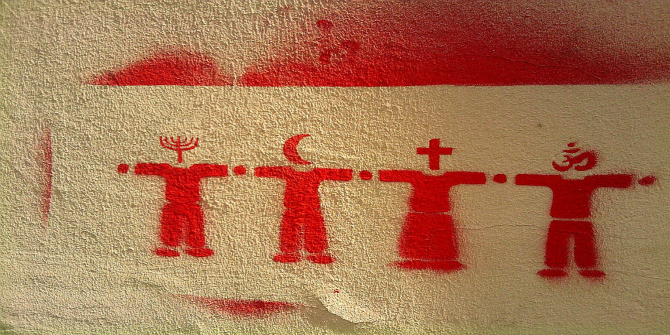Coffee is one of the most valuable Southern exports, generating billions of dollars in corporate profits each year, yet the majority of the world’s 25 million coffee families live in relative poverty. Gavin Fridell’s book aims to analyse the key factors shaping the coffee business. Michael Veale is impressed and recommends this to readers interested in trade, certification, and exploitation.

Coffee. Gavin Fridell. Polity. 2014.
A product as normalised as coffee, ubiquitous at home, work, and everywhere in-between, may be difficult for any of us to view in a critical and disconnected way. In a light and concise volume, Coffee, Gavin Fridell endeavours to help readers step back and take a historically informed and holistic approach to the development of the production, trade, marketing and consumption of this fairly odd dark drink. This topic is by no means novel for the social sciences —popular tropical commodities, especially coffee, have served as a well-documented sandbox for academics pondering development, new governance and marketing, among other fields. Work trying to weave a biography from these different strands is however a rarity, and given the great number of people worldwide holding coffee beans dear, should be eagerly welcomed.
Fridell argues that regardless of an interventionist or laissez-faire disposition, coffee producing and trading nations have been constantly engaged in what he calls ‘coffee statecraft’. Sceptical of the empirical pro-poor credentials of modern private governance schemes such as Fair Trade certification, he argues for states to engage in deeper and more meaningful interventions which emphasize the need to accept and redirect the fundamentally political foundations that the global coffee commodity system is built on, while resisting the allure of simply painting over the cracks with short-term bail-outs or piecemeal reform. Political bargains such as the International Coffee Agreements, creating export quotas and target prices, or state-owned coffee enterprises, such as those in Vietnam, have had their problems, but it is argued that at least for a time they created a period of less volatility and high standards of living for smallholder farmers worldwide.
Indeed, certification is no panacea for the problems of coffee growers. Supply of certified coffee far outstrips demand in every mainstream certification system, leaving many producers, who have invested in on-farm improvements and coughed up to ship in costly auditors charging by the day, unable to find the premium markets promised. Beyond this, the extent to which commodity standards can transform an entire sector can be questioned, as selection biases mean that farmers located near regional outposts of organisations such as Fair Trade may find achieving certification easier, as may farmers whose on-farm quality is already not far off what the standard requires.

However, Fridell’s treatment of coffee standards perhaps dismisses them a little unfairly and prematurely. For one, certification systems should be judged against their aims rather than an entire raft of desirable outcomes for a sector. Fair-trade standards are quieter on the topic of environmental management, while organic standards say little about pay and labour. But in a sense, this book brings that sharply into context —by illustrating how entrenched the patterns of exploitation, poor developmental and environmental performance associated with coffee are, Fridell reminds us that certification is a useful tool but one which alone cannot serve as a solution.
Yet while the book flags that private sector governance does not and cannot exist in a policy vacuum, it does not consider a revised role for it. This is perhaps a mistake. Asserting that the state that ‘holds the cards’should ensure they are ‘played much better’(p. 148) fails to ask what exactly such a hand would look like or entail. Is the private-public balance in global governance changing because private actors are emerging as the new long-term sovereigns as the state becomes lame, or because activism is increasing among changing ideas of legitimacy, or because the state cedes power as a tool to solve problems that transcend borders and elude unilateral solutions? Reinstating a quota system might serve economic and developmental interests, but sustainable development consists of optimizing on an array of dimensions, including the environmental. Messy problems have a tendency to require messy answers, and a feel of what a viable policy mix could ever look like in the 21st century would strengthen the recommendations Fridell presents.
The book captures the story of coffee well. It draws a complicated and overlapping history together in a surprisingly smooth and coherent narrative flow, which is no mean feat. The choice of theoretical lenses sometimes feels a bit repetitive and forced —David Harvey’s territorial and capitalistic logics of power within the capitalist state occasionally feels shoehorned in without adding a great deal to understanding, but this is a minor point. Specialists in certification are unlikely to pick up any useful new conceptual approaches from Coffee, but they are however likely to take away a lucky-dip of interesting historical vignettes.
And in a way, the future of such a volatile market as coffee, with complex and fluctuating socio-ecological systems underlying every economic, social, and environmental turn, can only be understood very generally through past experiences. As Donella Meadows notes, “if it’s a piece of music or a whitewater rapid or a fluctuation in a commodity price, study its beat. If it’s a social system, watch it work. Learn its history.” Looking from a historical basis leads to approaches based in behaviour rather than definitions centred on the lack of our favourite solution. Coffee is a humble wake up call reminding readers that just as their morning cuppa can become a bit too routine with a giant industry behind it, so too can their preferred policy strategies.
Michael Veale has a bachelor’s degree in Government and Economics from LSE and a master’s degree in Sustainability Science and Policy from Maastricht University. His main research interests are sustainability at the border of science and policy, private governance and certification, data visualisation, stakeholder participation and innovation. He is currently gathering experience in real-world public and private policymaking before hoping to return to academia to co-create some useful insights into complex problems.






